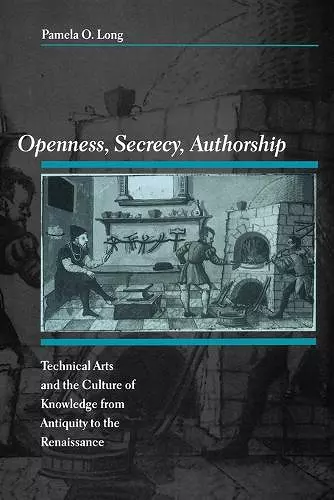Openness, Secrecy, Authorship
Technical Arts and the Culture of Knowledge from Antiquity to the Renaissance
Format:Paperback
Publisher:Johns Hopkins University Press
Published:18th Jan '05
Currently unavailable, and unfortunately no date known when it will be back

A history of the book and intellectual property that includes military technology and military secrets
She argues that "a useful working definition of authorship permits a gradation of meaning between the poles of authority and originality,and guides us through the term's nuances with clarity rarely matched in a historical study.In today's world of intellectual property disputes, industrial espionage, and book signings by famous authors, one easily loses sight of the historical nature of the attribution and ownership of texts. In Openness, Secrecy, Authorship: Technical Arts and the Culture of Knowledge from Antiquity to the Renaissance, Pamela Long combines intellectual history with the history of science and technology to explore the culture of authorship. Using classical Greek as well as medieval and Renaissance European examples, Long traces the definitions, limitations, and traditions of intellectual and scientific creation and attribution. She examines these attitudes as they pertain to the technical and the practical. Although Long's study follows a chronological development, this is not merely a general work. Long is able to examine events and sources within their historical context and locale. By looking at Aristotelian ideas of Praxis, Techne, and Episteme. She explains the tension between craft and ideas, authors and producers. She discusses, with solid research and clear prose, the rise, wane, and resurgence of priority in the crediting and lionizing of authors. Long illuminates the creation and re-creation of ideas like "trade secrets," "plagiarism," "mechanical arts," and "scribal culture." Her historical study complicates prevailing assumptions while inviting a closer look at issues that define so much of our society and thought to this day. She argues that "a useful working definition of authorship permits a gradation of meaning between the poles of authority and originality," and guides us through the term's nuances with clarity rarely matched in a historical study.
In our well-defined world of classicists, medievalists, and early modernists, books like Openness, Secrecy, Authorship have become increasingly rare. Pamela Long, ignoring all those unspoken caveats about periodization has courageously gone where few others dare to go by crafting an argument that extends from antiquity to the Renaissance and beyond. -- Andre Wakefield Technology and Culture This thorough and learned book is a significant addition to our knowledge of artisanal culture and writing, the history of authorship, the history of the book, and the history of science. It thus belongs on the bookshelf of scholars in a wide variety of fields. -- Kevin Dunn American Historical Review A historical argument of sweeping scale... In considering the shifting notions of openness and secrecy with respect to technical knowledge, and the varying styles and rewards of technical authorship over many centuries, Long sheds greater light on the fruitful interactions between craft practitioners, learned scholars, and the patrons who supported both... An engaging and detailed history of technical authorship. -- Eric H. Ash Early Science and Medicine Long's book inaugurates a new standard in the ongoing effort to breach field boundaries in pursuit of historical knowledge. It represents a welcome addition to the ongoing discussion and revision of renaissance intellectual history. Sixteenth Century Journal Long discusses above all the ways in which practical know-how and discursive traditions of knowledge have interwoven with each other to produce (just over the temporal horizon the seventeenth-century experimental philosophy mentioned in the book's 'Epilogue'. -- Peter Dear Studies in History and Philosophy of Science Through insightful interpretation of her sources, Long demonstrates how written texts can, in fact, provide evidence of secrecy. In the process, she provides a nuanced understanding of the relationship between knowledge, texts, power, and work. -- Beverly Sauer Renaissance Quarterly This important study examines the roles and implications for technical fields of what we would now call 'intellectual property,' from antiquity through the Renaissance. Much has been made, and rightly so, about changes in attitudes and access to technological knowledge and innovations during the seventeenth and eighteenth centuries... To identify, examine, and explain such changes over a broad span of time requires extensive, broad investigation and careful source reading. Long demonstrates both in a work that repays careful reading. -- Ann E. Moyer Speculum 2004 A fascinating overview of an enormous variety of writings in technical, craft and practical traditions from antiquity to the early modern period. British Journal for the History of Science 2004
- Winner of Morris D. Forkosch Prize for the Best Book in Intellectual History 2004 (United States)
ISBN: 9780801880612
Dimensions: 235mm x 156mm x 20mm
Weight: 454g
384 pages